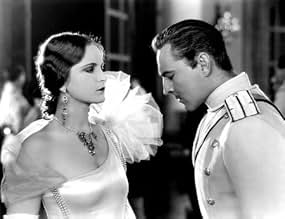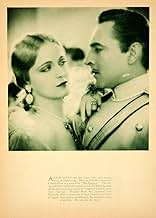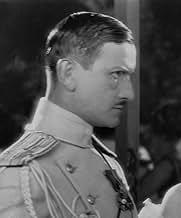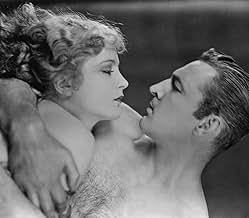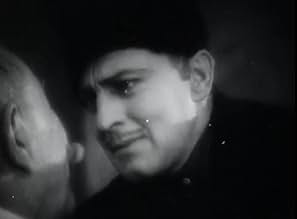IMDb-BEWERTUNG
6,7/10
572
IHRE BEWERTUNG
Füge eine Handlung in deiner Sprache hinzuIn Czarist Russia, a peasant officer, resented by the aristocrats, falls in love with a princess.In Czarist Russia, a peasant officer, resented by the aristocrats, falls in love with a princess.In Czarist Russia, a peasant officer, resented by the aristocrats, falls in love with a princess.
- 1 Oscar gewonnen
- 4 wins total
John Bleifer
- Soldier
- (Nicht genannt)
Albert Conti
- Commission Board Member
- (Nicht genannt)
Gregory Gaye
- Officer
- (Nicht genannt)
Lena Malena
- Tamara's Friend
- (Nicht genannt)
Michael Mark
- Soldier
- (Nicht genannt)
Dick Sutherland
- Revolutionary Board Member
- (Nicht genannt)
Wilhelm von Brincken
- Commission Board Member
- (Nicht genannt)
Empfohlene Bewertungen
Drama
Format: Standard 4:3, B&W, silent
Director: Sam Taylor
Starring: John Barrymore and Camilla Horn
Drew Barrymore's grandfather John is the main highlight of this film. His portrayal of Ivan Markov during 1914 Czarist Russia is ripe with excellent acting and great emotion, which flows forth from his face. Some supporting actors in this film were not too great, except for George Fawcett, who plays the commanding General of Ivan's garrison. The main problem with the characters and acting is too much fluff and too much over acting, but Barrymore is amazing.
In one scene, he is being demoted and sent to jail and the anguish coming off of his face, as they tear his medals off of his vest, is something to be seen. In another scene we see Ivan enter into madness and just the look on his face is something I won't forget for a while. While he is in prison, he begins to see images on the prison wall, which is done quite well with very good matte work for 1928.
Fawcett's character is very likeable and you enjoy seeing him every time he comes into a scene. His kindness he shows towards Ivan, from behind a rough exterior, is very believable and heart-warming. I also enjoyed Louis Wolheim as Bulba, but 3/4 of the way through the film his character changes and I didn't like that.
The story is quite good, and I worry that some of it may have been lost due to missing splices that looked like chunks of lost continuity. Right in the very beginning and especially at the very end. An excellent shot of the town opens up to a really nice story that falls apart slightly by the end, but definitely a film worth seeing. It is not great, but is very good.
8.2 (B MyGrade) = 8 IMDB.
Drew Barrymore's grandfather John is the main highlight of this film. His portrayal of Ivan Markov during 1914 Czarist Russia is ripe with excellent acting and great emotion, which flows forth from his face. Some supporting actors in this film were not too great, except for George Fawcett, who plays the commanding General of Ivan's garrison. The main problem with the characters and acting is too much fluff and too much over acting, but Barrymore is amazing.
In one scene, he is being demoted and sent to jail and the anguish coming off of his face, as they tear his medals off of his vest, is something to be seen. In another scene we see Ivan enter into madness and just the look on his face is something I won't forget for a while. While he is in prison, he begins to see images on the prison wall, which is done quite well with very good matte work for 1928.
Fawcett's character is very likeable and you enjoy seeing him every time he comes into a scene. His kindness he shows towards Ivan, from behind a rough exterior, is very believable and heart-warming. I also enjoyed Louis Wolheim as Bulba, but 3/4 of the way through the film his character changes and I didn't like that.
The story is quite good, and I worry that some of it may have been lost due to missing splices that looked like chunks of lost continuity. Right in the very beginning and especially at the very end. An excellent shot of the town opens up to a really nice story that falls apart slightly by the end, but definitely a film worth seeing. It is not great, but is very good.
8.2 (B MyGrade) = 8 IMDB.
TEMPEST (United Artists, 1928), presented by Joseph M. Schenck, directed by Sam Taylor, with uncredited work by Lewis Milestone, bears no relation to the William Shakespeare play, but is actually a military love story set against the background of the Russian Revolution in 1914. It stars the legendary "great profile" John Barrymore as Ivan Markov, a peasant soldier who becomes an officer in the Russian Army, after being told by his comrades that no peasant has been commissioned to a higher rank in years. After he and his officers take a swim in the lake with only their uniform trousers on, Sergeant Bubba (Louis Wolheim), Ivan's closest friend, who has encountered three young girls also bathing on the other side, as a practical joke, steals their clothing. After being told for what he has done, Ivan interferes in Bubba's meddling and takes the garments to return them to the ladies. As he is doing his good deed, Ivan is confronted by the Princess Tamara (Camilla Horn), who immediately accuses him of stealing the clothes. Quite upset, she suddenly takes Ivan's whip and beats his naked chest with it. In return, Ivan takes her into his arms and kisses her. Later that evening Ivan encounters Tamara once again at a social function, and learns that she is the daughter of his superior (George Fawcett), who loves Ivan like a son. Ivan and Tamara dance together, with Tamara doing nothing else but insulting him. Afterwards, Ivan then drowns out his sorrows by stocking up on wine in a huge drinking glass and gulping it all down at once. Now drunk, Ivan loses himself and accidentally stumbles upon Tamara's bedroom where he proceeds to fall asleep on her couch. After being discovered there, Tamara calls for her father and her suitor (Ullrich Haupt), which then puts an end to Ivan's military career as he is stripped of his uniform and sentenced to serve five years in prison. After the outbreak of the war, the calvary and the other prisoners are ordered to the front, which leaves Ivan behind in solitary confinement, as ordered by Tamara's suitor. Released by an insane communist peddler (Boris De Fas), Ivan joins forced with him to become an important official while Tamara and her father are no longer aristocrats in high social standing. Now that Ivan is in control, will he treat her as unjustly as he was misjudged by her?
TEMPEST, which plays like a proposed project for Rudolph Valentino, who has since died in 1926, offers John Barrymore in one of his finer performances of the silent screen. Camilla Horn, a blonde beauty recently imported from Germany, makes her Hollywood movie debut in this production. Before returning to her native Germany, she was re-teamed one more time with John Barrymore in the silent drama, ETERNAL LOVE (United Artists, 1929).
Presented in the supporting cast are Michael Visaroff, Lena Malena and Michael Marke. Louis Wolheim provides his usual comedic moments as Ivan's loyal friend, while Ullrich Haupt adds to his villainy as Tamara's jealous suitor. George Fawcett, the familiar face from numerous DW Griffith silents of long ago, gives his usual reliable performance as the Russian general who would later find himself facing a firing squad. And then there is not so well known Boris De Fas, menacing, sinister and gap-toothed who somewhat resembles John Barrymore's evil side of his other personality from his own version to the 1920 horror film, DR. JEKYLL AND MR. HYDE. This is his only known Hollywood screen role.
TEMPEST, with the running time of 104 minutes, was originally released theatrically with a synchronized musical score by Hugo Riesenfeld. It became one of the twelve selected films to appear during the summer months on New York City's public television Channel 13's 1975 presentation of "The Silent Years" as hosted by Lillian Gish, accompanied by another excellent piano score by William Perry from the Paul Killian collection. Before its presentation, Gish talks about the beautiful photography by Charles Rosher as well as the lavish sets by William Cameron Menzies. Besides these fine assets, TEMPEST includes several fine dramatic moments by Barrymore: One in which Barrymore's Ivan becomes very teary-eyed as he is disgraced in front of his regiment, stripped of his uniform with his sword broken in half by a superior, and another in which Ivan, nearly going insane while being left in solitary confinement, surrounded by those high prison walls, only to look up on one of those walls and imagining the face of Tamara looking down at him, but as for John Barrymore's earlier drunken scene, for him that must have been a natural.
Like many silent films distributed around 1928-29, TEMPEST has become underrated and forgotten due to lack of television or any other kind of revival over the years. It was distributed on video cassette in the 1980s through Blackhawk Video and Republic Home Video (Blackhawk's merger), accompanied by the William Perry piano score used for "The Silent Years" (1975). Distribution on DVD from Image Entertainment contains choices of underscoring: 1)Original 1928 orchestral score and 2) Piano accompaniment by Philip Carli. (***)
TEMPEST, which plays like a proposed project for Rudolph Valentino, who has since died in 1926, offers John Barrymore in one of his finer performances of the silent screen. Camilla Horn, a blonde beauty recently imported from Germany, makes her Hollywood movie debut in this production. Before returning to her native Germany, she was re-teamed one more time with John Barrymore in the silent drama, ETERNAL LOVE (United Artists, 1929).
Presented in the supporting cast are Michael Visaroff, Lena Malena and Michael Marke. Louis Wolheim provides his usual comedic moments as Ivan's loyal friend, while Ullrich Haupt adds to his villainy as Tamara's jealous suitor. George Fawcett, the familiar face from numerous DW Griffith silents of long ago, gives his usual reliable performance as the Russian general who would later find himself facing a firing squad. And then there is not so well known Boris De Fas, menacing, sinister and gap-toothed who somewhat resembles John Barrymore's evil side of his other personality from his own version to the 1920 horror film, DR. JEKYLL AND MR. HYDE. This is his only known Hollywood screen role.
TEMPEST, with the running time of 104 minutes, was originally released theatrically with a synchronized musical score by Hugo Riesenfeld. It became one of the twelve selected films to appear during the summer months on New York City's public television Channel 13's 1975 presentation of "The Silent Years" as hosted by Lillian Gish, accompanied by another excellent piano score by William Perry from the Paul Killian collection. Before its presentation, Gish talks about the beautiful photography by Charles Rosher as well as the lavish sets by William Cameron Menzies. Besides these fine assets, TEMPEST includes several fine dramatic moments by Barrymore: One in which Barrymore's Ivan becomes very teary-eyed as he is disgraced in front of his regiment, stripped of his uniform with his sword broken in half by a superior, and another in which Ivan, nearly going insane while being left in solitary confinement, surrounded by those high prison walls, only to look up on one of those walls and imagining the face of Tamara looking down at him, but as for John Barrymore's earlier drunken scene, for him that must have been a natural.
Like many silent films distributed around 1928-29, TEMPEST has become underrated and forgotten due to lack of television or any other kind of revival over the years. It was distributed on video cassette in the 1980s through Blackhawk Video and Republic Home Video (Blackhawk's merger), accompanied by the William Perry piano score used for "The Silent Years" (1975). Distribution on DVD from Image Entertainment contains choices of underscoring: 1)Original 1928 orchestral score and 2) Piano accompaniment by Philip Carli. (***)
"Tempest" will be of interest to anyone who wants an example of John Barrymore's considerable screen presence. He's quite good as a star cadet culled from the ranks of the Russian peasantry whose fortunes take a turn for the worse when he falls foul of his boss's daughter. The story is pure melodrama, with lots of arched eyebrows and swooning romantic embraces, but Barrymore pulls it off with flair, and there's something ahead of its time about his acting. It's natural in a way that a lot of acting in the silent era (and even for a while after) wasn't.
The film overall is a bit saggy, and suffers from lugubrious pacing and static shots that linger past the point when they should. William Cameron Menzies won the first Academy Award given for art direction for his work on this film and another from the same award year, "The Dove," while Charles Rosher, who won the first cinematography Oscar for "Sunrise," provides the camera work. To be sure the film looks good, but it would have benefited from crisper editing.
A not overly memorable film from the last days of the silents, but enjoyable for what it is.
Grade: B
The film overall is a bit saggy, and suffers from lugubrious pacing and static shots that linger past the point when they should. William Cameron Menzies won the first Academy Award given for art direction for his work on this film and another from the same award year, "The Dove," while Charles Rosher, who won the first cinematography Oscar for "Sunrise," provides the camera work. To be sure the film looks good, but it would have benefited from crisper editing.
A not overly memorable film from the last days of the silents, but enjoyable for what it is.
Grade: B
Enjoyable historical drama in which The Great Profile plays a Russian peasant who rises to the rank of Lieutenant immediately before the revolution only to find himself shunned by his fellow officers and the haughty princess he falls for. Fine chemistry between Barrymore and the beautiful German actress Camilla Horn helps paper over most of the film's meagre flaws.
TEMPEST was the penultimate silent movie made by John Barrymore (ETERNAL LOVE directed by Ernst Lubitsch would be the last). The setting is not Shakespeare but takes place around the time of the Russian Revolution. The direction is credited to Sam Taylor who was best known for his comedies but a lot of it was shot by Lewis Milestone and visually it shows in many of the scene compositions and camera angles.
The film is primarily remembered today for Charles Rosher's cinematography, the sets by William Cameron Menzies, and as the Hollywood debut of German actress Camilla Horn (Murnau's FAUST). While not a great movie, it does have a lot to offer especially for silent movie and/or John Barrymore fans.
This version from Kino is part of a 4 DVD set of silent films by John Barrymore although it can be purchased separately (BELOVED ROGUE, DR JEKYLL & MR HYDE, SHERLOCK HOLMES make up the rest of the set). The picture quality is good and although it says it's from 35mm, a lot of it looks like 16mm to me. This print is courtesy of the Killiam Collection and contains some pro-Soviet bits that were later removed.
The piano score is by William Perry. Back in 2003, Film Preservation Associates released their DVD version through Image Entertainment. It is clearly from 35mm although a little scratchier and offers two separate soundtracks (the original Vitaphone discs and a piano score by Philip Carli) as well as a one reel home movie of Barrymore on his yacht. That's the one to own although this release comes in a close second...For more reviews visit The Capsule Critic.
The film is primarily remembered today for Charles Rosher's cinematography, the sets by William Cameron Menzies, and as the Hollywood debut of German actress Camilla Horn (Murnau's FAUST). While not a great movie, it does have a lot to offer especially for silent movie and/or John Barrymore fans.
This version from Kino is part of a 4 DVD set of silent films by John Barrymore although it can be purchased separately (BELOVED ROGUE, DR JEKYLL & MR HYDE, SHERLOCK HOLMES make up the rest of the set). The picture quality is good and although it says it's from 35mm, a lot of it looks like 16mm to me. This print is courtesy of the Killiam Collection and contains some pro-Soviet bits that were later removed.
The piano score is by William Perry. Back in 2003, Film Preservation Associates released their DVD version through Image Entertainment. It is clearly from 35mm although a little scratchier and offers two separate soundtracks (the original Vitaphone discs and a piano score by Philip Carli) as well as a one reel home movie of Barrymore on his yacht. That's the one to own although this release comes in a close second...For more reviews visit The Capsule Critic.
Wusstest du schon
- WissenswertesCarole Lombard was considered for the role of Princess Tamara.
Top-Auswahl
Melde dich zum Bewerten an und greife auf die Watchlist für personalisierte Empfehlungen zu.
Details
Zu dieser Seite beitragen
Bearbeitung vorschlagen oder fehlenden Inhalt hinzufügen

Oberste Lücke
By what name was Wetterleuchten (1928) officially released in Canada in English?
Antwort


